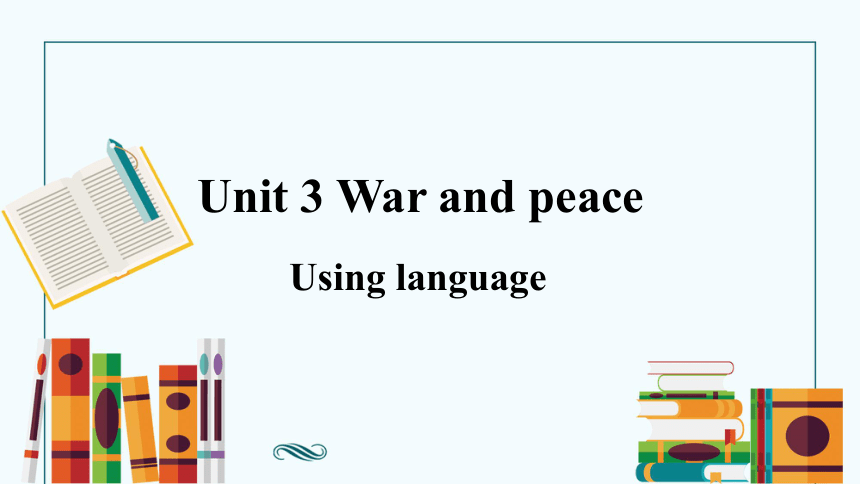(
课件网) Using language Unit 3 War and peace Learning objectives 1.To know the subject-verb agreement; 2. To use subject-verb agreement correctly; 3. To know the horrible Chongqing bombing, its influence and remembrance by listening, learn to express sympathy and talk about memories; 4. To talk about someone’s experience in war. Grammar a. Your enemy is well trained, well equipped and battle-hardened ... b. The enemy were hiding, ready to attack the Allied soldiers ... c. ... people were coming together for memorial ceremonies. Activity 1 Look at the sentences from the reading passage and answer the questions. 1. In which sentence does the word “enemy” refer to different members Is it followed by a singular verb or plural verb 2. In which sentence does the word “enemy” refer to a single unit Is it followed by a singular verb or plural verb Do you know any other similar nouns 3. Is the word “people” usually followed by a singular verb or plural verb Do you know any other similar nouns 1. In which sentence does the word “enemy” refer to different members Is it followed by a singular verb or plural verb In sentence (b), the word “enemy” refers to different members. It is followed by a plural verb. 2. In which sentence does the word “enemy” refer to a single unit Is it followed by a singular verb or plural verb Do you know any other similar nouns In sentence (a), the word “enemy” refers to a single unit. It is followed by a singular verb. Other similar nouns are family, team, class, crowd, government, etc. 3. Is the word “people” usually followed by a singular verb or plural verb Do you know any other similar nouns The word “people” is usually followed by a plural verb. Other similar nouns are police, cattle, etc. 主谓一致的题型考查主语为集体名词时,考查谓语动词单复数的使用情况。 主谓语一致 集体名词表示由个体组成的集体,指一群人或某一事物的总称。集体名词作主语时谓语的单复数问题,可以归纳为以下三类: 警察在追捕他。 The police were after him. 人们开始谈论她。 People are beginning to talk about her. 牛以草为食。 Cattle feed on grass. 1) 有的集体名词通常表示复数含义,作主语时谓语通常用复数形式,比如 police / people / cattle等。例如: 2) 有的集体名词通常只用作不可数名词,表示单数意义,用作主语时,谓语动词用单数形式,比如 clothing / poetry / luggage / furniture / machinery / scenery / jewellery, equipment 等。例如: 我们的衣服可以御寒。 Our clothing protects us against the cold. 他们所有的行李都被偷了。 All their luggage was stolen. 这家具搬起来很方便。 The furniture is convenient to move. 这个工厂里所有的机器都是中国产的。 All the machinery in the factory is made in China. Her family is a large one. 她的家庭是一个大家族。 3) 有的集体名词作主语时,谓语动词可用单数形式,也可用复数形式。若视为整体,谓语动词用单数形式;强调集体中的各个成员时,谓语动词用复数形式,比如 family / team / class / crowd / government / club / committee / audience / public 等。例如: 她的家人都很高。 Her family ... ...

